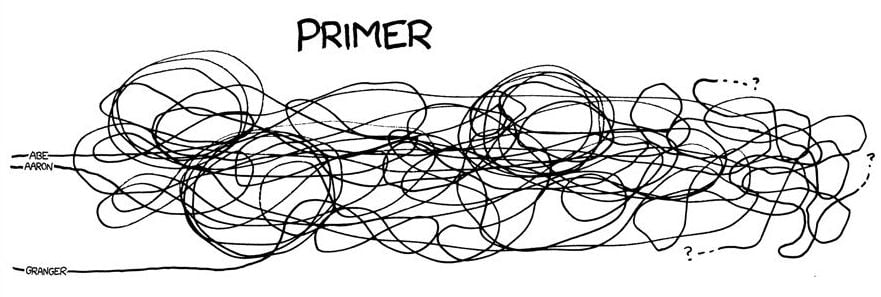Some ideas are:
- You branch off into another timeline and your actions make no difference to the previous timeline
- You’ve already taken said actions but just didn’t know about it so nothing changes
- Actions taken can have an effect (so you could suddenly erase yourself if you killed your parents)
- Only “nexus” or fixed events really matter, the timeline will sort itself out for minor changes
- something else entirely
Paradoxes slowly disintegrate the timeline you’re in. Thousands of years, Deadpool 3 rules.
Is that what’s happening irl?
It happens in Deadpool so it must be true /s
- You branch off into another timeline and your actions make no difference to the previous timeline
New actions, new consequences.
This. Time traveling is a purely selfish endeavour.
Go back and kill Hitler? Congratulations! Only you understand what changed. Doesn’t help the 7 billion people you left in your original timeline.
But you now get to live in a cool alternate reality where the soviet union clashed directly with the allied forces as the axis never existed.
. . .
Kirov reporting.
The most interesting one to me, and the one that makes the most sense, is that changes propagate forward in time at the same speed as everything else, so 1 second per second. Why would causality suddenly decide to go any faster than that? This effectively means that all “alternate timelines” exist on the same timeline, and overwrite each other as they move forward.
You can visualize this by coloring the original timeline red. When you time travel backwards, you arrive at an earlier point on the timeline and it begin overwriting it orange, with the “head” of the orange section expanding into its future, which is previously red. If someone travels into the orange area again, it turns yellow, etc. If the instant where you time travelled backwards to make the orange region gets overwritten, the color of the timeline to the left of the orange region would begin expanding to overwrite it at the same speed as any other change.
This does lead to some interesting things, like two time travel loops that include the same point in time literally slowly corrupting the timeline. One loop, where you travel back, wait until when you left, then travel back again, would cause the future from your departure point to continually be overwritten by each new loop color, sending constant-width “bands” of colored time forward before they’re overwritten by the band from the next loop. Two loops’ bands would almost certainly not be commonly divisible, so you’d eventually end up with “bands” moving forward and within the loop that get smaller and smaller, fragmenting the timeline into colored noise. If you lived on the timeline, though, you wouldn’t notice-- even if you’re in a timeline band that’s only 1 second wide, you move with it, so nothing seems out of the ordinary. But if you travelled back to the same point in time repeatedly to check on it, or could freeze yourself in time and watch the bands pass through your point in time, things would be changing incredibly quickly. This also means that waiting time in the future before travelling backwards in time would let the past have time to be overwritten by a different band, so the same point in time would be different depending on when you left the future. All timeline damage would be repaired (at band-expansion speed) if you could remove all instances of time travel backwards to the offending loops, though.
IRL, the speed of causality depends on your speed, too, and in theory, timeline changes would expand outward at the speed of light. My brain is not big enough to think through all the potential consequences of relativistic weirdness and time travel at once, though. I suspect it would allow for “bands”/fragmentation not only in time but in space as well.
The reason time depends on speed is because you are always moving at the speed of light, but the vast majority of that is going in the 4th dimension: time. If you speed up in a given direction you’re losing speed through time to make up for it.
I always found that idea so cool for some reason
I really like the nothing is changeable and travel is possible and anything you do while traveling has already happened / was already going to happen concept
I wouldn’t say I “like” the idea, since it’s one of the most doomed ways for a universe to be, but Greg Egan’s Arrows of Time is a good exploration of this idea.
Traveling to the past: You can’t go into the past because doing so would change who you are and thus your reason for traveling in the first place. For example, killing Hitler when he was a baby would completely change the world as we know it, thus change you as you are. You might not have been born, or if you were, you wouldn’t know who Hitler was, so there was no reason to go into the past, thus your time travel never happened in the first place. It’s a paradox via butterfly effect. To underscore this further, you couldn’t even change the history of another planet’s species simply because it’s still a part of your timeline. Same universe.
The only scenario where it might work is going into the past as an impartial observer and not having any impact at all (some kind of magical bubble where you are invisible and no effect on the past). That would be fun, because you get to learn about history firsthand.
An interesting time travel alternative is Trunks’ timeline from Dragonball Z, where he went to the past, saved their future, but the androids in his timeline still persisted. This leads me to believe it was not just another time but another dimension (a la Rick and Morty).
Traveling to the future is a bit easier. Technically, with the proper spacecraft, you can go into the future (go sit around Sag A* for a bit), but it would be a future where you weren’t around to have an influence in it. It would be like temporarily kidnapping yourself. This might be similar to how people came back five years later after being snapped by Thanos in the MCU.
IMO, the best use of time travel would be to go to the future tomorrow to scan ahead and see what happens (as long as you wouldn’t have been needed in that future), then going back to the present time just seconds after you left. So little would have changed that your timeline would remain intact (only your biological clock would be off). So, you might be able to prevent incidents in the world by constantly jumping ahead to see what was going to happen. A future-scanning time traveler might have been able to prevent the recent New Orleans tragedy from happening. They could also be lazy and just learn the winning lottery numbers.
Isn’t jumping forward and then changing stuff in your timeline just traveling to the past with extra steps? If doing something in the past changes the now changing something in the now based in future outcome would also change that outcome.
My personal favorite?
Space and time is an infinite number of parallel realities that constantly compress and unravel at every possible random chance. We are 4th (or 3.5th) dimensional beings that experience the most probable result aggregated from an infinite existence. If you time travel back in time, and change the past, it would not affect the your past, but it would affect your future, if you time traveled back to your current time.
I was just reading this article about a mathematical understanding of closed time-like curves.
In essence, the argument is that time travel to the part is possible with a degree of free will, but you would not be allowed to alter the part in such a way as to remove the motivation for traveling back in time. E.g., it would be like Futurama where Fry kills his grandfather, but he impregnates his grandmother, this allowing himself to be born. The idea is that the timeline would correct itself and ensure that your future self will always return to the past.
- something else
3 dimensions of space + 2 dimensions of time
Yes. If you go back in time, you end up where the Earth used to be at that moment, I.e. thousands, hundreds of thousands, millions, hudreds of millions kms away. Arguably, if you go back a full galactic year you can end up somewhat in the vincinity of the solar system.
Time travel wouldn’t be by jumps but by contionous change in perpendicular* time dimension.
So earth wouldn’t escape from your feet as you would move with it, just like you are doing right now with just one dimension.
*time travel would be imposible if you can move only in one direction. ~~Then the 2nd time dimension would need to be under some funky angle (3/4π>α>1/2π and α≠π and α≠0) ~~ i am wrong
Like in Black Science, I think time travel would fuck with the fabric of reality. Make it shreddy.
I do not believe in nexus events; there is a personal reason I don’t expect anyone else to believe but I don’t.
Just watched Arrival again yesterday and that’s my other guess. More like your choice of “you have already done it, you can’t alter the timeline” but can’t go outside your lifetime, time doesn’t work the way we think and we can perceive other “times” because they aren’t really linear, just some quirk of our perception makes it seem that way, you really exist concurrently all along your existence.
But if some machine was designed to take you before or after your lifetime, it would tear at the fabric of reality (lifetime not exactly the correct word but your existence that has a beginning and end of some sort).
Primer because Primer. (Video warning and some spoilers for a bunch of different films.)
I don’t know if I would subscribe to it, but it is one of the more interesting ideas for time travel.
Primer spoilers, kinda, xkcd style:
Title

Probably the branch off one.
Though, speaking of time travel, I really don’t understand/like the whole Harry Potter dementor (however it’s spelt) lake scene in the movie where future Harry saves past Harry. How does that work? Wouldn’t in an initial timeline Harry have to somehow save himself before he could travel back in time to save his past self? The way I see it, it just looks like an infinite cycle of Harry saving his past self with no origin point.
I like the one where the motion of the universe is not accounted for, so the travelers drop into empty space. But someone figures out how to use that to travel through space.
Time Wars are fun though. Each prime timeline moving others toward them.
Be a potentially energy-efficient way to exit a gravity well in a spacecraft if you could exploit that and it doesn’t require too much energy. Instead of launching a spacecraft, just send it back in time to when a point was no longer in that well.
EDIT: if the above conditions hold (it’s possible and requires less energy than launch), you also have an infinite-energy-production machine, because you can obtain more potential energy than you are expending energy to time-travel.
If you screw up the calculation, your time machine can also end up deep under the mantle of the Earth. That would be a pretty spicy way to travel.
You’ve already taken said actions but just didn’t know about it so nothing changes
12 Monkeys did this one perfectly.
You can’t change things because if you undid the thing, then there wouldn’t be a reason to undo the thing. If you go back in time, you are just going to do what you already did because that is in the past.
Oh, I’ll have to watch that
Logically speaking it’s the only way time travel can be done, and for bonus points physics wouldn’t have a problem with it.
Any Back to the Future shenanigans is just creating alternate realities, which may or may not instantly destroy the original.
I’d totally forgotten about 12 monkeys. I had that VHS of this when I was 11 or 12 years old, I probably watched it 30 times and I never fully understood it. 25 years later I think it’s time for me to rewatch this
Rewatched it recently, it held up really well!
If you go back in time, you are just going to do what you already did because that is in the past.
Only if the Universe is deterministic. If not, random rolls having different outcomes may completely change the course of events and decisions made by people.
Nothing is truly random, including the weather. It is extremely complex and difficult to predict, but once it happens that is what happened. As long as dice fall with the exact same speed and hit the same surface in the same spot at the same angle it will always end up with the same result. The randomness of dice comes from how the very small differences influence the outcome.
Going back in time with the knowledge of what happened the first time means that either you will choose the same thing because something led to that original choice or something will keep you from interfering. Free will exists because we don’t literally know the exact outcome of our actions or the things outside of our control in advance.
Nothing is truly random
Modern physics says otherwise. Einstein also thought exactly like that with his “hidden variables” theory which was later disproven.
Edit: I was interested to read some relevant discussions and here’s some links with quotes
https://philosophy.stackexchange.com/questions/29364/does-true-randomness-actually-exist
It seems very likely that every deviation from perfect homogeneity and isotropy in the universe is due to amplified quantum fluctuations. (That’s true in inflationary cosmology, and I’d expect it to be true in practically any alternative to it.) For example, the shape of Earth’s land masses was probably determined by quantum fluctuations, and has had an enormous influence on human history.
Quantum fluctuations is basically true randomness on quantum level.
The randomness is largely canceled out, except in the case of unstable systems which magnify the effects of any perturbations, no matter how small.
You’re assuming that time travel is equivalent to “rewinding” the intervening time span as if it had never occurred—in which case, yes, nondeterministic events are likely to happen differently.
But that’s not the case if time travel is a closed time-like loop (which is implicit in the “immutable-past” scenario in OP’s point 2). In that case everything happens only once, so it makes no difference whether or not the universe is strictly deterministic.
Maybe this is the same as what you’re saying but my issue with the idea that “You’ve already taken said actions but just didn’t know about it so nothing changes” is that it means time travelers don’t have any free will once they go back in time. If that’s the case, then it bring up existential concerns and that might extend to non backwards time travelers (i.e. us)
I think from a physics standpoint, strict free will is already an illusion and the only useful definitions of free will basically boil down to “choices can be made”, perhaps as far as “Slight differences in initial conditions can lead to different choices” (but somehow excluding random processes). That kind of definition doesn’t even require consciousness, and is compatible with a deterministic universe like ours seems mostly to be. Would also be compatible with the time traveler unwittingly doing everything as must happen, but still via individual choices.
Are you saying that even without time travel, free will is an illusion? Surely there has to be a time travel scenario, like going back 1 second in time and shaking hands, where all information is known to both travelers, and the future self would know what was done previously, and can choose to take a different action.
Choice is one of the slight differences that can lead to different outcomes. A rock falling down a hill will always fall downhill because of gravity. An animal can choose to slow itself or even work against gravity to move uphill. Instead of gravity, there are a ton of prior experiences that will influence that choice, but choice is still a distinct part of the process.
Exactly. That’s why I think the only useful definitions of free will are those that are weak enough to distinguish between the animal and the rock in a situation like that.
"Default behaviors is undo, no redo. You control undo the undo. Emacs.
I recommend undotree, which is also a non-destructive undo, but for some cases makes it easier to reach those points.
Are you asking which system I think is the most plausible, or which is the most desirable?
Plausibility:
Well, I’d guess that time travel probably isn’t possible, and if it is, it’s probably under extremely limited conditions that render it impractical for viable exploitation. But if you’re operating under the assumption that it is, I’d say the “your actions do not affect this timeline” or similar type.
Why?
We have had no record of time travel or seen phenomena likely resulting from it. If at time T, time travel is discovered, it seems unlikely that someone after that time wouldn’t have come back in time and done something that we’d have noticed.
And it’s not just us. If self-timeline-affecting time travel is possible, then you consider all the possible civilizations out there in the universe who might discover it at some point in time and want to take advantage of it. Yet we’ve seen nothing from them. It’s the Fermi Paradox on steroids. The Fermi Paradox asks why intelligent aliens, half of whom statistically probably evolved before us and should have colonized the universe if they’re out there, aren’t visible to us. The time to travel over even huge distances, though it is large, is small compared to the time required to evolve a spacefaring civilization. But in the presence of self-timeline-affecting time travel, then even the evolutionary time becomes a non-factor, since civilizations from the future could also show up, and roll back in time with their advanced technology and make use of it from then. The question is no longer just “where is everyone”, but the even harder to explain “where is everyone from all time?”
Okay, that’s the plausibility question. How about the desirability one, which system I’d like to exist?
Hmm. I guess I’d give the same answer, the “no affecting your own timeline” form. I think that if you could affect your own timeline, that probably some kind of incident in the future – only takes one – would be likely to have mucked up things sufficiently to wipe out civilization, and we probably wouldn’t be around to even be pondering the matter.
Branch off probably













